

Create Livable Alternatives To Wage Slavery. Welcome to CLAWS.
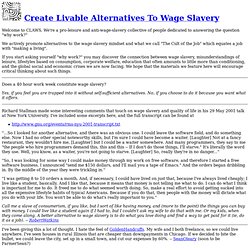
We're a pro-leisure and anti-wage-slavery collective of people dedicated to answering the question "why work? " We actively promote alternatives to the wage slavery mindset and what we call "The Cult of the Job" which equates a job with "making a living". If you start asking yourself "why work? " you may discover the connection between wage slavery, misunderstandings of leisure, lifestyles based on consumption, corporate welfare, education that often amounts to little more than conditioning, and the global social and economic crises we are now facing.
We hope that the materials we feature here will encourage critical thinking about such things. Www.economicadventure.org/pdfs/full.pdf. Communalism (political philosophy) Communalism (spelled with a capital C to differentiate it from other forms) is a libertarian socialist political philosophy coined by author and activist Murray Bookchin as a political system to complement his environmental philosophy of social ecology.
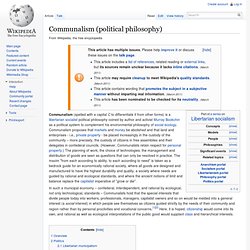
Libertarian socialism. Overview[edit] Libertarian socialism is a Western philosophy with diverse interpretations, though some general commonalities can be found in its many incarnations.
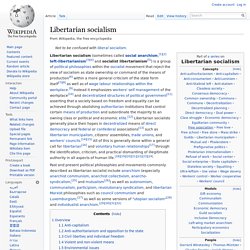
Consumerism-and-Product-Quality_JMJuran-94.pdf (application/pdf Object) Create Livable Alternatives To Wage Slavery. Bertrand Russell. Russell led the British "revolt against idealism" in the early 20th century.[58] He is considered one of the founders of analytic philosophy along with his predecessor Gottlob Frege, colleague G.
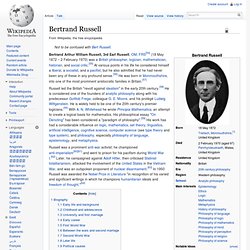
E. Moore, and his protégé Ludwig Wittgenstein. He is widely held to be one of the 20th century's premier logicians.[55] With A. N. Whitehead he wrote Principia Mathematica, an attempt to create a logical basis for mathematics. Russell was a prominent anti-war activist; he championed anti-imperialism[60][61] and went to prison for his pacifism during World War I.[62] Later, he campaigned against Adolf Hitler, then criticised Stalinist totalitarianism, attacked the involvement of the United States in the Vietnam War, and was an outspoken proponent of nuclear disarmament.[63] In 1950 Russell was awarded the Nobel Prize in Literature "in recognition of his varied and significant writings in which he champions humanitarian ideals and freedom of thought Biography.
Wage Slavery. Quote:

Wage slavery. Wage slavery refers to a situation where a person's livelihood depends on wages or a salary, especially when the dependence is total and immediate.[1][2] It is a pejorative term used to draw an analogy between slavery and wage labor by focusing on similarities between owning and renting a person.
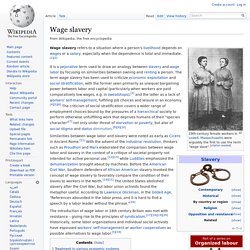
Similarities between wage labor and slavery were noted as early as Cicero in Ancient Rome.[11] With the advent of the industrial revolution, thinkers such as Proudhon and Marx elaborated the comparison between wage labor and slavery in the context of a critique of societal property not intended for active personal use,[12][13] while Luddites emphasized the dehumanization brought about by machines. Treatment in various economic systems[edit] Adam Smith noted that employers often conspire together to keep wages low:[24] Greek Town Implements Revolutionary Barter System Without Euro. Activist Post Greece continues along a path toward self-sufficiency that could very well see them break free from their debt servitude.
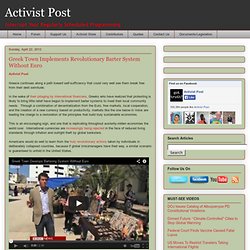
In the wake of their pillaging by international financiers, Greeks who have realized that protesting is likely to bring little relief have begun to implement barter systems to meet their local community needs. Through a combination of decentralization from the Euro, free markets, local cooperation, and the creation of a new currency based on productivity, markets like the one below in Volos are leading the charge to a restoration of the principles that build truly sustainable economies. This is an encouraging sign, and one that is replicating throughout austerity-ridden economies the world over.
International currencies are increasingly being rejected in the face of reduced living standards through inflation and outright theft by global banksters. You can support this information by voting on Reddit: Why Can't Chuck Get His Business Off the Ground? What Happened to the 40 Hour Work Week? Does anyone work a 40 hour work week anymore?

You know, the comfortable, predictable “9 to 5” that we often complained about during more certain times? Apparently fewer employees than ever still have this luxury, and if current trends continue, fewer still will have it in the future. An article by Seth Fiegerman on Yahoo Finance earlier this month, The End of the 40-Hour Work Week confirms these changes in work schedules and the forces behind them: “Higher-level workers are increasingly being asked to put in 50 hours or more a week…while lower income workers are often forced to work fewer hours but at jobs with irregular schedules, according to a comprehensive report from the Center for American Progress…Driving these changes…are companies turning lower-level full-time jobs into part-time employment to cut costs, savings that come at the expense of workers — and their families — losing the traditional schedules and financial benefits that come with full-time employment.”
Remind Me Again — Why Do We Need Economists? Robert A.
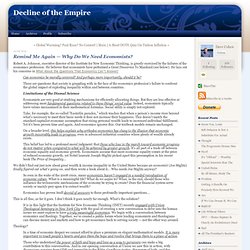
Johnson, executive director of the Institute for New Economic Thinking, is greatly exercised by the failures of the economics profession.